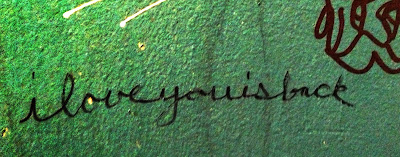I spent my life in school, much of the time believing that it wasn't the real world. I taught art in colleges for about 35 years and then became dean of liberal arts for three and a half years, my first real job. I thought being a dean would be a good opportunity to grow up and that maybe I could accomplish that in a year or so. Little did I know that it would only take a couple of days … and it would let me see the real world.
Retirement in 2007 was an interesting challenge. I had imagined that I would wake up one day and wonder, "what will I do today?" That hasn't happened yet, and it has been six years. Instead, I set a goal for myself: to prepare for another career as a teacher. But this time I wanted to know the truth. I decided to investigate Buddhism or Judaism—so I did both. I found two terrific teachers. I didn't like Judaism because it just seemed about the past, so I went with Buddhism, which I've been involved with for about six years. And I've become much more interested in early writing rather than contemporary teachings. Oh, and I also thoroughly enjoy a Torah study group which is taught by a number of rabbis, all of whom like to linger over the meaning of a word or phrase. That’s probably one of my favorite pastimes. And I've become totally uninterested in the truth, realizing that emptying my teacup is a far better way to embracing new ideas.
As a teacher and then college administrator I was aware of the power of students. Their only constraint is often that they don't know what they can do. Now I'm having fun as a student, especially with my interest and ability to change organizations. The one colleague who always butted heads with me complained that, "The trouble with Kim is that he has these ideas and then he does them." That sums up much of my life (and as I read about my classmates, most of our lives).
When I was young I had a speech problem when has led me up interesting mountains. I noticed in the yearbook that I never was in any "clubs." Once in grade school everyone in music class had to sing in front of the class, everyone, that is, but Kim. I was both relieved and insulted. In high school a bunch of guys came into Gordon's to get something to eat. One of them noticed I was sitting there and said they should invite me over. Another said, "Oh Kim, he has nothing to say." Then my senior English teacher told me I wouldn't pass Freshman English in college. Once I told Mom that I was doing something new, and she said, “Oh, you probably aren't any good at that either.” Even in a drawing class in college, my teacher (who loved what I did) said to the class, “Anyone can learn to draw. Then he looked over at me, and said, “Anyone, that is, but Mosley.” (That turned out to be blessing.)
But I had a very nurturing grandfather and some good friends. And the biggest hope came from a story my father told me about Demosthenes, an Ancient Greek who stuttered and was inarticulate. He put pebbles into his mouth and gave speeches over the roar of the ocean. Continuing with this practice daily he became a great orator. Though I loved pebbles I never gave a speech to the roar of the waves (except once when I was drunk), but I did find myself in situations where I need to talk in front of a crowd, starting with freshman English that was combined with a speech class. That morphed into almost finishing a degree in English, which was cut short by a French requirement (more on that to come). I finally earned a BFA. In my second teaching job I I realized that I had no idea how to sit with a room of peers and talk. I started joining all the committees I could and soon started leading them.
I think our greatest accomplishment is our ability to attend to this present moment in a wholehearted way. That might be the summation of this journey I've been on for 67 years. Marcus Aurelius said that we should leave each day as if we’ll be judged on that for eternity. That idea stuck in my head 50 years ago; I knew that there was something valuable there that I couldn’t understand yet. We each build all kinds of things in our lives: families, places, and relationships, but the real accomplishment is how manage the next moment. Between my Zen practice and my wife’s practice of Japanese tea ceremony, I’ve come to realize that nothing is more important than how we touch something or someone. That is why I now begin all emails with the word “Dear.” It reminds me how special we all are, and that I’m now going to show that I care for this person.
All that I have is my ability to contend with the challenge of this moment. And this moment moves into the next, and as I pass that moment, I face a new challenge. Today I was stressed because I had done something that one person didn't approve ... others did. It was a no-win situation. As I sat in meditation, I became aware that it was my body was sitting and breathing gently. The stress that my mind had created moved on as my breath went in and out. Then I could write this. I am thankful for the opportunity to struggle, to love, and to learn. What a privilege it is to be human, and how lucky to reconnect with so many of you.






